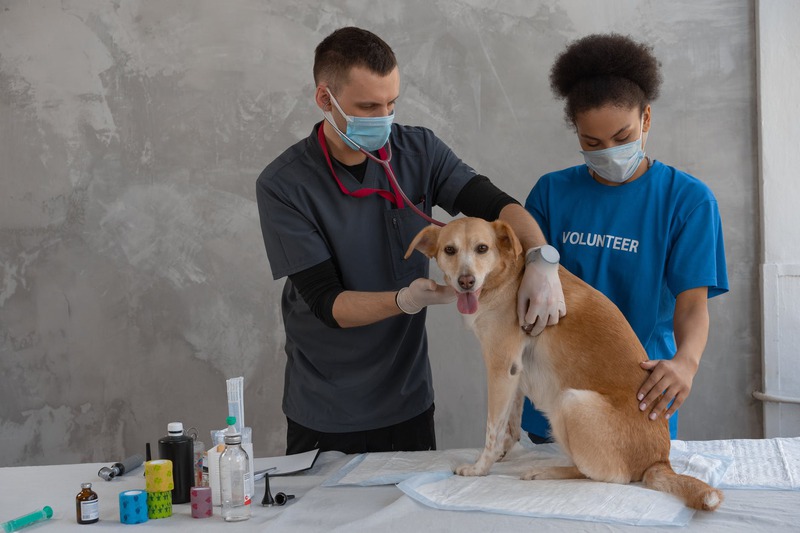Fleas and ticks are not just pesky nuisances that cause itchiness and discomfort for our furry companions; they can also pose significant risks to their overall health and well-being. These tiny parasites can transmit harmful diseases and cause various health issues impacting your pet’s quality of life. As a responsible pet owner, it is essential to understand the connection between fleas, ticks, and your pet’s overall health and take proactive measures to protect them.
Navigating the World of Parasites
In this article, we’ll explore the relationship between two types of parasites, fleas and ticks, and the potential impact on your pet’s health. We’ll also discuss the importance of pet vaccinations, bathing, grooming, and veterinary surgery.
Fleas and Ticks: Small Pests, Big Problems
Fleas and ticks can significantly threaten your pet’s health despite their tiny size. Here’s what you need to know about these pests:
Fleas:
- Small, agile, and wingless insects
- Female fleas can lay up to 50 eggs per day
- Feed on the blood of mammals and birds
Ticks:
- Arachnids related to spiders
- Attach themselves to a host and feed on blood
- They can carry dangerous diseases such as Lyme, and Rocky Mountain spotted fever.
How Fleas and Ticks Threaten Your Pet’s Health
Fleas and ticks are more than annoying; they can cause severe health problems when unchecked. Some key concerns include:
- Allergies: Flea and tick bites can trigger pet allergies, causing itchiness, inflammation, and even infections.
- Anemia: Flea infestations can lead to anemia, a deficiency in red blood cells, causing your pet to become weak or lazy.
- Transmission of diseases: Ticks can spread bacteria and diseases such as Lyme disease, and Rocky Mountain spotted fever, which can be life-threatening if left untreated.
Pet Vaccination, Prevention, and Control
Effective pet vaccination and parasite prevention are essential to keep your pet healthy and avoid the perils of fleas and ticks. To learn more about reliable prevention methods, visit veterinary websites, such as this website, which offers comprehensive information on pet health issues.
A solid parasite prevention plan should include the following:
- Regular veterinary visits and checkups
- Flea and tick prevention treatments such as collars, spot treatments, or oral medications
- Keeping your pet’s environment clean and free of pests
- Regularly check your pet for any signs of fleas or ticks
When Veterinary Surgery is Necessary
In severe cases, untreated parasite infestations may lead to your pet requiring veterinary surgery. Surgery may be necessary to address complications from untreated flea and tick infestations, such as removing abscesses, amputating limbs due to tick paralysis, or performing a blood transfusion for anemic pets. A skilled veterinary surgeon will assess your pet’s condition and determine the best action. To find a reputable veterinary surgeon near you, visit veterinary websites or online directories. Don’t hesitate to click on a link to learn more about their services.
Pet Bathing and Grooming for Parasite Prevention
Regular pet bathing and grooming are essential to help keep parasites at bay and assist in your pet’s overall care.
Some grooming tips include:
- Brush your pet’s fur regularly to remove loose hair, debris, and dead skin cells.
- Bathe your pet with an appropriate shampoo to help control parasites and maintain a healthy coat and skin.
- Trim your pet’s nails regularly to avoid overgrowth and injury.
- Inspect your pet’s ears and clean them gently to prevent infections.
Not only will grooming keep your pet’s coat in good condition, but it also presents an opportunity to detect early signs of fleas, ticks, or skin irritations. For professional pet bathing and grooming recommendations, consider contacting a reputable local animal hospital, such as Brogli Lane Weaver & Alexander Animal Hospital, which can provide experienced grooming services.
Conclusion
Fleas and ticks are a significant threat to your pet’s overall health. Tackling this issue requires a comprehensive approach, including pet vaccination, grooming, and potentially even veterinary surgery if complications arise. Keep a watchful eye on your pets, practice diligent prevention methods, and maintain a clean environment to help safeguard their health and happiness. Your furry friends will thank you for it!





